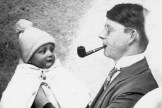More from the Review
Subscribe to our Newsletter
Best of The New York Review, plus books, events, and other items of interest
Advertisement
More from the Review
Subscribe to our Newsletter
Best of The New York Review, plus books, events, and other items of interest

The Whistleblower We Deserve
The ambiguous hero of Henrik Ibsen's An Enemy of the People is a man of science who insists on the primacy of truth and evidence. But he’s also, possibly, a bit of a fascist.
An Enemy of the People
a play by Henrik Ibsen, adapted by Amy Herzog and directed by Sam Gold, at Circle in the Square, New York City, March 18–June 23, 2024
May 23, 2024 issue

Defying Tribalism
In her new polemic, the philosopher Susan Neiman charges her fellow leftists with intellectual betrayal and calls for a return to universal ideals of justice and humanity.
Left Is Not Woke
by Susan Neiman
November 2, 2023 issue

The Trouble with Ancestry
Two recent family histories authored by Americans connected to Europe’s terrible twentieth century by their fascist grandfathers seek to occupy the void between history and memory.
Fatherland: A Memoir of War, Conscience, and Family Secrets
by Burkhard Bilger
Come to This Court and Cry: How the Holocaust Ends
by Linda Kinstler
September 21, 2023 issue
Subscribe and save 50%!
Read the latest issue as soon as it’s available, and browse our rich archives. You'll have immediate subscriber-only access to over 1,200 issues and 25,000 articles published since 1963.
Subscribe now